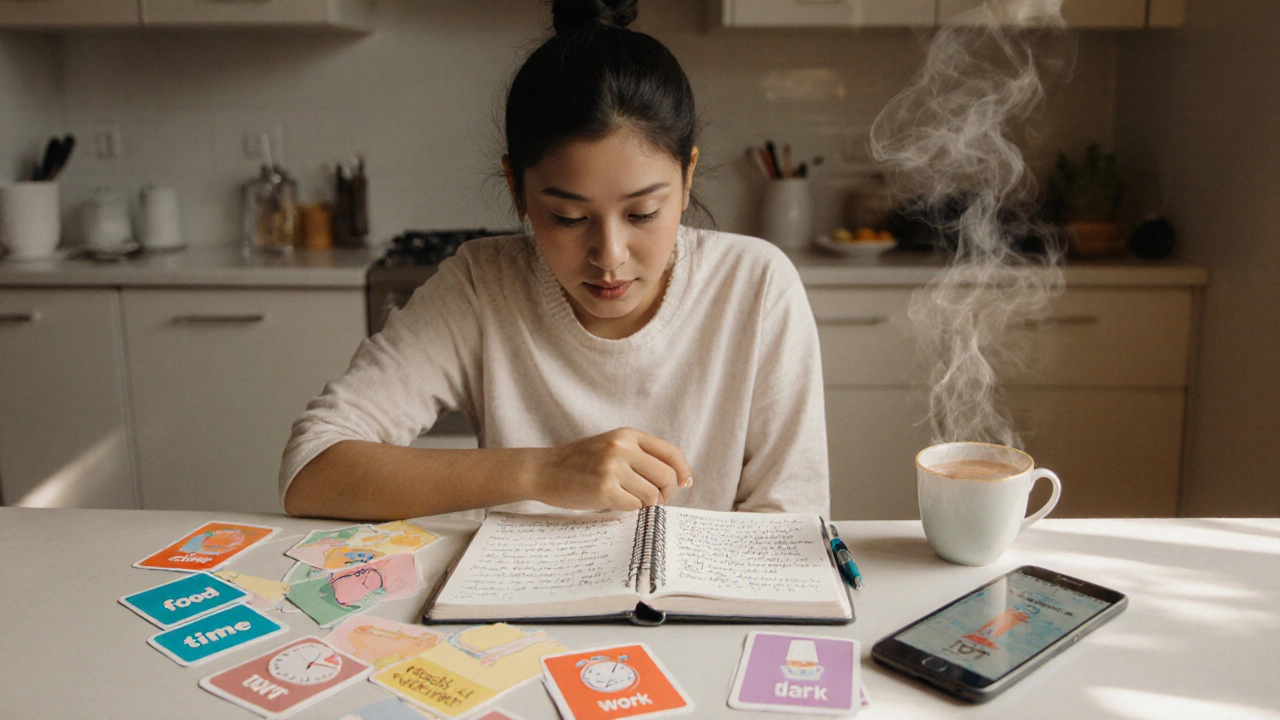Beginner English Speaking Progress Tracker
Daily Practice Goals
Set your daily speaking practice targets to build consistency.
Your Progress
Track how much you've practiced today and your overall progress.
Today's Practice Log
Activities Today:
- No activities recorded yet
Recommended Resources
Speaking English for Beginners is the process of turning passive knowledge of the language into active, confident conversation. It feels scary at first, but the right habits make it doable for anyone willing to practice a little every day. This guide walks you through the exact steps you need to take, from building a word bank to finding live conversation partners, so you can start speaking English without waiting for a perfect grammar score.
Build a solid vocabulary base
Vocabulary is the toolkit that lets you express ideas, ask questions, and respond in real time. Start with 500 high‑frequency words - the ones you’ll hear in everyday chats, like "food," "time," "work," and "family." Use flashcards or spaced‑repetition apps to review them daily. A good rule of thumb is the 80/20 principle: 20% of the words cover 80% of everyday conversations. Keep a notebook for new words you hear on podcasts or videos, and write a simple sentence for each to cement the meaning.
Master basic pronunciation
Pronunciation is what turns your word list into understandable speech. Begin with the most troublesome sounds for your native language - for example, the English "th" or the vowel distinction in "ship" vs. "sheep." Record yourself reading short sentences, then compare the recording to native speakers on YouTube or language apps. Imitating the rhythm and intonation (the rise‑and‑fall of the voice) is more effective than memorizing isolated sounds.
Listen and repeat
Listening practice trains your ear to pick up natural speed and collocations. Choose materials at a comfortable level - beginner podcasts, short news clips, or dialog‑driven videos. Play a 10‑second segment, pause, and repeat it aloud, matching stress and tempo. Doing this for 15 minutes a day builds a mental map of how native speakers link words together.

Find speaking partners
Language exchange gives you real‑time feedback and forces you out of the rehearsal zone. Websites like HelloTalk or Tandem let you pair up with native English speakers who want to learn your language. Set a simple agenda: spend five minutes introducing yourself, five minutes answering a question, and five minutes discussing a topic you both like. Consistency beats intensity - a 10‑minute chat three times a week beats a marathon session once a month.
Use online tools and apps
Online resources make practice portable. Free platforms such as Duolingo, BBC Learning English, and ESLPod provide bite‑sized lessons that you can fit into a coffee break. For speaking, apps like SpeakEasy or the conversation‑practice feature in Cambly let you talk to tutors on demand. Choose one tool for vocabulary, another for listening, and a third for live conversation to keep the routine varied.
Learn the grammar you really need
Grammar basics for beginners focus on three structures: simple present, present continuous, and basic question forms. These cover most everyday exchanges - "I work at a shop," "I am eating lunch," "What do you like?" Practice each structure by writing three sentences a day, then say them aloud. Grammar becomes less daunting when you see it as a scaffold, not a wall.

Boost confidence and overcome fear
Confidence building is the hidden driver behind fluency. Start by speaking to yourself in the mirror - narrate your morning routine in English. Then move to low‑stakes situations: ordering coffee, asking for directions, or leaving a voice message. Celebrate every successful exchange, however small, and treat mistakes as data points for improvement.
Quick resource comparison
| Resource | Type | Cost | Platform | Best for |
|---|---|---|---|---|
| Duolingo | App | Free (ads) / $6.99/mo Premium | iOS, Android, Web | Daily vocab drills |
| BBC Learning English | d>Website & PodcastFree | Web, Podcast apps | Listening & pronunciation | |
| HelloTalk | Language exchange app | Free / $4.99/mo VIP | iOS, Android | Finding native partners |
| YouTube (English with Lucy) | Channel | Free | YouTube | Pronunciation tutorials |
| Local meet‑ups (e.g., Birmingham Language Café) | In‑person group | Free or low fee | City venues | Live conversation practice |
Next steps and troubleshooting
- If you feel stuck after a week, double‑check your daily routine - aim for at least 20 minutes of active speaking time.
- Struggling with pronunciation? Spend extra 5 minutes each session on minimal‑pair drills (e.g., ship/sheep).
- Can't find a partner? Join an online forum like Reddit r/EnglishLearning and post a short intro seeking a chat buddy.
- Forgot new words? Review your flashcards before bed; the brain consolidates vocab during sleep.
Frequently Asked Questions
How much time should a beginner spend each day?
Aim for 20‑30 minutes of focused practice. Split it into 10 minutes of listening, 10 minutes of speaking, and 10 minutes of vocabulary review for balanced growth.
Do I need to study grammar before I start speaking?
No. Learn the three most common sentence patterns first. Real‑world speaking will naturally reinforce the grammar you need.
What’s the best way to overcome the fear of making mistakes?
Treat each mistake as data. Write down what went wrong, look up the correct form, then practice the corrected sentence until it feels natural.
Can I become conversational without ever traveling to an English‑speaking country?
Yes. Consistent online conversation, listening to native media, and joining local meet‑ups replicate many of the immersion benefits you’d get abroad.
How do I track my progress?
Keep a simple log: note the date, minutes spoken, new words learned, and a short self‑rating (1‑5) for confidence. Review the log weekly to see patterns and celebrate improvements.
